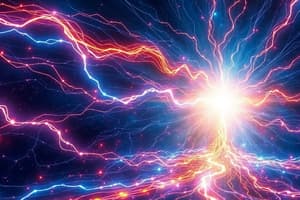Podcast
Questions and Answers
What does Faraday's law describe in electromagnetic induction?
What does Faraday's law describe in electromagnetic induction?
- The relationship between magnetic field strength and charge.
- The potential difference across a capacitor.
- The force acting on a moving charge in a magnetic field.
- The relationship between induced EMF and the rate of change of magnetic flux. (correct)
Which factor influences the magnitude of the force experienced by a moving charge in a magnetic field?
Which factor influences the magnitude of the force experienced by a moving charge in a magnetic field?
- Only the magnetic field strength.
- The type of material the charge is passing through.
- The charge, velocity, and magnetic field strength. (correct)
- The duration of time the charge is in the magnetic field.
In the absence of an electric field, how does the force on a moving charge relate to its velocity?
In the absence of an electric field, how does the force on a moving charge relate to its velocity?
- The force is unaffected by the velocity.
- The force is opposite to the velocity.
- The force is parallel to the velocity.
- The force is always perpendicular to the velocity. (correct)
What does capacitance measure in a capacitor?
What does capacitance measure in a capacitor?
What is the primary role of inductance in an electric circuit?
What is the primary role of inductance in an electric circuit?
What creates an electric field?
What creates an electric field?
How is the strength of an electric field measured?
How is the strength of an electric field measured?
What is the relationship between electric and magnetic fields?
What is the relationship between electric and magnetic fields?
What type of wave are electromagnetic waves?
What type of wave are electromagnetic waves?
What are the units of magnetic field strength?
What are the units of magnetic field strength?
Which of the following applications relies on electromagnetic principles?
Which of the following applications relies on electromagnetic principles?
What do Maxwell's equations primarily describe?
What do Maxwell's equations primarily describe?
What happens to the force exerted on a charged particle in a magnetic field?
What happens to the force exerted on a charged particle in a magnetic field?
Flashcards
Force on moving charges
Force on moving charges
Moving charges in a magnetic field experience a force perpendicular to both the velocity of the charge and the magnetic field.
Electromagnetic induction
Electromagnetic induction
Generating an electromotive force (voltage) by changing a magnetic field.
Faraday's Law
Faraday's Law
The induced EMF is proportional to the rate of change of magnetic flux.
Capacitance
Capacitance
Signup and view all the flashcards
Inductance
Inductance
Signup and view all the flashcards
Electromagnetism
Electromagnetism
Signup and view all the flashcards
Electric Field
Electric Field
Signup and view all the flashcards
Magnetic Field
Magnetic Field
Signup and view all the flashcards
Electromagnetic Waves
Electromagnetic Waves
Signup and view all the flashcards
Maxwell's Equations
Maxwell's Equations
Signup and view all the flashcards
Electromagnetic Radiation
Electromagnetic Radiation
Signup and view all the flashcards
Electric and magnetic field relationship
Electric and magnetic field relationship
Signup and view all the flashcards
Speed of light
Speed of light
Signup and view all the flashcards
Study Notes
Studying That Suits You
Use AI to generate personalized quizzes and flashcards to suit your learning preferences.




